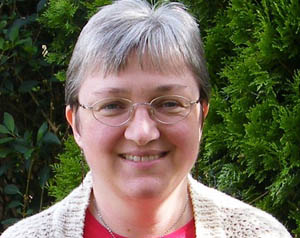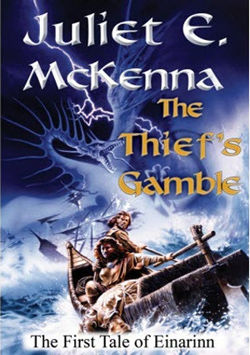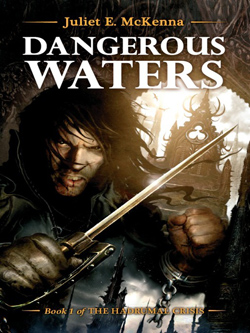BLOG Welcome to Einarinn: An Interview with Juliet E McKenna
Alasdair Stuart talks to one the greatest living fantasy authors about creating new worlds
What made you decide to become a writer?
“The impulse to invent my own stories has always been with me since I first engaged with narrative through reading, television and film. Any ‘write a story’ assignment at school was a gift. In my twenties I wrote what I fondly believed would be the Definitive Blockbuster Fantasy Masterwork, and which (deservedly) collected an array of rejection slips from agents and editors rather than the bidding frenzy I’d naively imagined. My conscious decision to try to become a professionally published writer came after I’d spent some time in bookselling, and learned all the many good and varied reasons why the DBFM hadn’t made the grade. By then I was at home with two small boys as the cost of childcare made going back to work uneconomic, so I needed a new career that I could fit around the family – and vice versa.”
Whose work has influenced you?
“I’ve given up trying to answer this question. I could list 50 names, in all genres, and by this evening I’d have thought of 20 more. Then when someone reads my answer, they’ll say, ‘Oh but what about so-and-so?’, and I’ll realise yes, they’re right, even if I’d never realised that for myself before. So the simple and honest answer is everything I’ve ever read or seen will have influenced me one way or another.”

Tell us a little about Einarinn. What made you decide to set the majority of your work in one world?
“Einarinn is a fantasy world with a solidly historical basis in the late-medieval/early modern period, so different countries, different cultures and languages, are all shifting and evolving in different ways as the years pass – technologically, philosophically and politically. There’s competition for influence and resources. There’s magic – more than one sort – and those who can use such magical power have to deal with all those things I’ve just mentioned.
“I don’t think I ever made a conscious decision about continuing to write in this world. It just happened. Reaching the end of the story arc in each of my series left me thinking about new challenges I’d glimpsed along the way. Once I’d used the Aldabreshin Archipelago as a backdrop in a book in the “Tales”, the more ideas I had for a whole series set there. After mentioning the Lescari strife here and there, I was drawn to focus on that. Then it was time to really look closely at Hadrumal and the wizards there.”
Sign up to the SFX Newsletter
Get sneak previews, exclusive competitions and details of special events each month!
Has it ever felt restrictive?
“No, thankfully, and I think that’s because I’ve written four distinct series rather than one all-encompassing narrative. If it had, I’d have done something else. I’ve always written short fiction, non-fiction here and there, and that’s given me a change of mental pace and different writing challenges along the way.”

What would be a good place to start for new readers?
“Well, each series is complete in itself, so The Thief’s Gamble is the start of the “Tales” where a female gambler and occasional thief with no interest at all in the affairs of wizards and princes nevertheless gets blackmailed into helping them out, and soon finds her own reasons for sticking around. “The Aldabreshin Compass” starts with Southern Fire where an absolute ruler with power of life and death over everyone in his domain faces unforeseen and deadly challenges when his people are attacked with magic. He has no way to fight back since wizardry’s illegal on pain of death in his culture, so he has to think and act fast. Irons In The Fire starts “The Chronicles Of The Lescari Revolution”, which gets underway when peasants, exiles and rebels decide they’re fed up with the dukes who wish to be king wrecking everyone else’s lives.
“I might have some reservations about recommending starting with Dangerous Waters , since it does refer back to earlier books quite a bit. But I’ve had email from people who’ve done just that and they’ve loved it, so what do I know?”
Tell us about the role of magicians in Einarinn?
“There are two sorts of magic in Einarinn. There’s wizardry which stems from an innate ability to sense and manipulate elemental air, earth, fire and water. This is magebirth. Since untrained wizards are potentially lethal, young mageborn have long been sent to be apprenticed in the island-city of Hadrumal where they’re trained to control such powers. A lot of wizards stay there, studying and refining their understanding of magic. Others return to the mainland and use their magical talents to earn a living in whatever way they choose. Any ambition to use their power for evil or excess is curbed by the knowledge that they’re subject to the Archmage’s authority all their lives, and if they step out of line Hadrumal’s justice will be fast and final.
“Then there’s Artifice which is a mental magic using what’s known as the aether linking all living things. Enchantments include the ability to communicate over vast distances, to see through someone else’s eyes, even to influence their thoughts and behaviour. This isn’t an inborn talent. In theory anyone can learn Aetheric magic – apart from wizards whose magebirth makes it impossible for some reason. In practice, it takes a great deal of study, concentration and the temperament that goes with such focus. Artifice was far more widely known in the past but most knowledge of it was lost when the Tormalin Empire collapsed. It’s been rediscovered in recent years, in archive sources and also among the people who live in the remote northern mountains.”

What's the basic premise of the Hadrumal Crisis books?
“As you might imagine, no one in Einarinn likes the idea of wizards getting involved in warfare. So this has been forbidden by an Archmage’s Edict for as long as anyone can remember. But the thing about rules is, every so often, someone decides to break them. That first happened in The Wizard’s Coming , a short story I wrote (now available as a free ebook). So the Archmage has to act. But he’s not the only one who knows what’s happened. The Caladhrian coast has been raided by vicious pirates for a handful of years. So Corrain of Halferan, a warrior who’s been enslaved by those pirates, is determined to get home and then to find a wizard willing to use his magic to fight the raiders.
“If the Archmage objects, Corrain has learned a few things which he reckons the Archmage won’t want more widely known. Only good intentions are rare enough, especially when events take unforeseen turns as they invariably do. Now the Archmage, and particularly, his confidante, the magewoman Jilseth, have far more problems to deal with than just keeping Corrain quiet. Now the mainland’s rulers are seeing just how powerful magic can truly be and they don’t like what they’re seeing at all. Nor do the Aldabreshi, who firmly believe that all wizards should be killed on sight. Meantime, Lady Zurenne of Halferan, widow of Corrain’s liege lord, is trying to protect her home and family in the midst of all the upheaval she’s been dragged into. None of these three, the trilogy’s main characters, ever set out to be epic heroes.”
You mentioned technology there, and the late-medieval/early modern period is quite a fun one for technology and science. What breakthroughs does Einarinn share with the real world?
“I don’t think I’ve referenced any specific technological breakthroughs, probably because I haven’t had a particular plot hinge on one of those. There have been breakthroughs in magical learning which have directly influenced events but that’s a different story, in every sense. Developments like moveable type and printing are leading to wider literacy, and people like ‘natural philosophers’ are exploring alchemy and similar proto-sciences leading to improvements in metallurgy which are having an ongoing influence on society, off in the background. There’s evidence of water and land management through canals and harbour building. If communication with the Aldabreshin Archipelago opens up, knowledge of mathematics and optics derived from their astronomy could well see mainland science shift into a higher gear. Of course, the one breakthrough there hasn’t been is the widespread use of gunpowder, though there’s evidence that different races have some knowledge of explosives. That would open up a whole lot of new questions, wouldn’t it? Especially about wizards and warfare. Excuse me while I jot down a few notes...”
I love the way you portray magicians as having huge power and freedom but still being beholden to Hadrumal. What influenced the creation of Hadrumal and its laws?
“I’m a graduate of St Hilda’s, Oxford and so the history of that particular university and of English scholarship generally in the medieval period is something I find fascinating. I drew on that, and also on the intense focus of some academics I met as a student, to explain why most wizards have no real interest in ruling the world. Hadrumal was particularly influenced by the European universities in France and Italy which trained doctors and regulated the study of medicine. When students are learning stuff which could kill people as easily as help them, the rules and regulations tend to be a bit stricter.”
Artifice as you describe it sounds like it's set to play a major role in upcoming books. Do you have an idea for the next series?
“Yes, Artifice has a lot of potential, as you will see in Defiant Peaks , where we learn quite a bit more about it, and about who can exploit its unnerving potential. As to what I write next, I have all sorts of ideas for stories, from short fiction to novellas to full-length novel series. What I’ll do next is still being discussed, so I’ll let you know when there’s definite news.”
I love that your work looks at the consequences of choices, both good and bad, especially with regard to magic and its use. Has this led to any surprises, any major plot twists you didn't see coming?
“Oh, yes, time and again. I learned early on that the unfolding momentum of this world’s internal logic and the influence of developing characters can end up with events seriously at odds with the story outline I’ve written. People can end up unexpectedly dead, which is highly inconvenient when they’re supposed to be playing a major role in the following book. Minor characters end up in the right place and at the right time to take on a significant role which I never intended. Take a bow, Allin Mere.
“As I’ve developed the theory and understanding of magic, I’ve hit various points where if X is true, then Y must inevitably follow, however much I might wish to dodge that implication. On the other hand, those same implications often offer up some awesome plot twist which I hadn’t seen back in the book’s planning stage. Ten years ago, I would try to force the book back on track, only to end up giving in to those plot twists in the rewrites. Now I’ve learned to keep a more open mind, and to enjoy the challenge of those moments when the only thing to do it take a red pen to my outline and start crossing out and scribbling in the margins. Because the book will definitely be better for it.”
Do you have a favourite place in Einarinn?
“I like writing about this whole world so that’s a hard question to answer. I think the place I’d most like to visit as a tourist would be Toremal, the capital city of the Tormalin Empire which I first detailed in The Warrior’s Bond . It has real depth of history, as shown in the various styles of architecture in its different districts and in the ways that old buildings are now being used for different purposes. There are long-established local customs as well as new fashions and ideas brought in by successive newcomers. It has its rougher areas but mostly its peaceable enough, thanks to the sworn men of the noble houses. There’s a political and artistic culture as well as popular entertainment for the masses. I reckon a holiday there would be fascinating.”
Defiant Peaks , the third book in the “Hadrumal Crisis Trilogy”, is released on the 6 December


